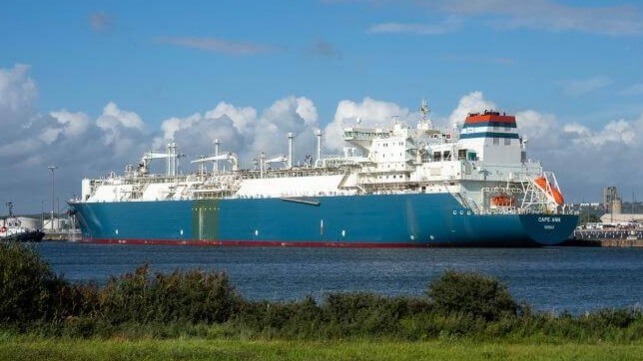France's First FSRU Commissioned as Efforts Continue to Replace Russian Gas

France’s first floating storage and regasification unit (FSRU) for liquefied natural gas (LNG) completed commissioning and has come online. Located in Le Havre, the project joins similar efforts in Germany, the Netherlands, and Finland in Northern Europe, as well as several projects in the Mediterranean, each designed to increase import capacity and replace Russian gas supplies.
TotalEnergies reports that the terminal that is using its vessel the Cape Ann (112,457 dwt) has injected its first gas into the grid operated by GRTgaz. The vessel, which is owned by Höegh LNG and is operated by TotalEnergies, was built in 2010 and has a storage capacity of 142,500 cubic meters. The vessel arrived in Le Havre in mid-September from Gibraltar where it had been outfitted for its new assignment. The first LNG shipment came from Norway.
The Cape Ann is being repositioned to France and is expected to operate for a minimum of five years providing an import LNG capacity. Previously, she has been positioned in Tianjin, China for the last decade having become in 2013 the first floating storage and regasification unit in China.
TotalEnergies has contracted for half of the terminal's annual capacity of around 5 billion cubic meters, to supply it with LNG from its global portfolio. The remaining capacity will be marketed according to rules approved by the regulator. The company began contracting for the capacity in February reporting that several companies had expressed strong interest in the capacity. They were confident in committing all the capacity of the vessel.
The project had been a long time in planning having been first announced in the summer of 2022 as others such as Germany also worked to launch new FSRU-based terminals. The French project, however, faced opposition from environmentalists which asserted that the country already had LNG supplies and did not need more capacity. When the Cape Ann arrived on September 18, she was met by protestors from Greenpeace attempting to prevent her from docking.

that matters most
Get the latest maritime news delivered to your inbox daily.
This is the second FSRU project for TotalEnergies tied to the efforts to expand Europe’s capacity. The company also chartered the Neptune (81,000 dwt) to serve as an FSRU. The vessel was positioned last December in Lubmin in Eastern Germany. It is a private project working with Deutsche ReGas, while the German government supported the placement of other FSRUs in the western parts of the country.
After the delivery of the Neptune to Germany, and the Cape Ann to France, TotalEnergies highlights that it is now providing a regasification capacity of over 20 million tons per year, equivalent to 15 percent of total European capacity. The company has become Europe’s largest LNG importer.
